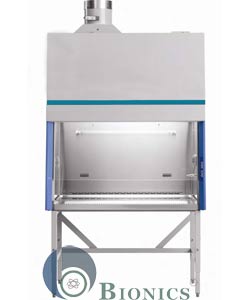What Might Be Next In The microbiological safety cabinet
What Might Be Next In The microbiological safety cabinet
Blog Article
Class 2 Biosafety Cabinets: Essential Equipment for Laboratory Safety and Microbiological Containment

In today’s scientific and clinical labs, safety for personnel and samples is non-negotiable. Whether it's biotech development, pharmaceutical research, or microbiological analysis, biosafety cabinets form the backbone of contamination control.
Of all types, Class 2 cabinets are most commonly used due to their efficiency and versatility. These units are indispensable tools for pathogen handling and biological research.
Overview of Biosafety Cabinets in Laboratory Environments
Biosafety cabinets are ventilated enclosures built to protect both users and biological materials. They use HEPA filtration to remove contaminants from incoming and outgoing air.
These units are generally classified into three main types: Class I, II, and III based on containment level. Among these, Class 2 cabinets are the most versatile and commonly used.
Defining Class 2 Biosafety Cabinets and Their Role
Class 2 Biosafety Cabinets ensure safety on all fronts—personnel, workspace, and biological material. They utilise downward laminar airflow within a sealed system.
Both incoming and outgoing air are HEPA-filtered to maintain sterility and prevent leaks. These cabinets are frequently used in labs handling infectious agents or clinical samples.
What Makes Class 2 Cabinets Effective in Labs
A Class 2 microbiological safety cabinet includes several integrated safety mechanisms such as:
• Medical-grade filters for capturing contaminants
• Laminar airflow that minimises disruption and contamination
• Pressure differentials that maintain internal containment
• Optional UV lights for overnight sterilisation
• Low sound emissions to reduce fatigue
• Clear front panel for visibility and safety
These elements create a clean, contained, and user-friendly workspace.
Where Class 2 Cabinets Are Used
Class 2 Biosafety Cabinets are commonly used across microbiology, biotechnology, diagnostics, and pharma. They are ideal for safe handling of samples during testing and experimentation.
From universities to private pathology labs, Class 2 cabinets ensure lab hygiene and sample integrity.
Why Laboratories Prefer Class II Safety Cabinets
Using Class 2 cabinets offers numerous benefits for safety, accuracy, and lab hygiene:
• Prevents contamination during sensitive procedures
• Shields operators from harmful aerosols and pathogens
• Ensures filtered air is safe for release or recirculation
These cabinets support biosafety goals while improving lab productivity.
Regulatory Standards for Class 2 Cabinets
Top manufacturers build Class 2 cabinets in accordance with strict international guidelines. Class 2 units are sub-classified as A1, A2, B1, and B2—with each type offering different air handling systems.
• Type A2: Most commonly used cabinet model
• Type B2: Suited for labs dealing with toxic agents
Choosing the correct subtype is vital for achieving optimal safety and functionality.
How to Select a Class 2 Safety Cabinet
Before purchasing, consider:
• The types of agents and materials handled
• Ventilation compatibility and placement
• Energy consumption and maintenance frequency
• Manufacturer reputation and post-sale support
Partnering with a trusted provider helps meet both performance and safety needs.
Safe Setup and Operation of Class 2 Cabinets
For optimal results:
• Avoid placing near doors, vents, or fans
• Get periodic validation from certified technicians
• Educate staff on cabinet operations and safety
Operational best practices include:
• Use gloves, gowns, and face shields while operating
• Avoid sudden or quick arm movements
• Decontaminate surfaces before and after use
• Treat UV microbiological safety cabinet usage as an overnight sterilisation method
Why Class 2 Cabinets Are a Must-Have in Labs
Class 2 biosafety cabinets are vital equipment in laboratories dealing with biohazards. They ensure contamination-free experiments and personnel safety.
From biotech and diagnostics to academia and pharma, Class II cabinets copyright the highest biosafety levels. When investing in a biosafety cabinet, opt for trusted brands that offer end-to-end service—because safe science starts with smart containment. Report this page